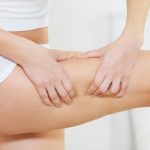Unlike the proper way or process of growing hair, ingrown hairs are more like an opposite way of growing hair – inward. There is a black bumpy feel on the skin which is accompanied with blackness. This elevated skin has hair grown inside the skin, inwardly instead of outwardly. How it happens and what causes it can be read under the separate heading. But in one sentence, it is due to the blockage of dead skin which holds the hair sac.
Ingrown hair isn’t troublesome and can be dealt at home. They are not even a disease but a condition. Instead, these ingrown hair can be the source of uncomfortable and awkward. How does it makes its way to the skin, what are the symptoms, treatment and when should you visit a doctor for this purpose needs some guidelines which are going to help you deal with it. Fortunately, this article is a complete guide on how to treat ingrown hairs.
Appearance Of Ingrown Hair:
 Ingrown hair comes with the package where the pain is produced upon pressing it hard or trying to take it out with bare hands. It is a red or black pimple like thing which is embarrassing enough for others to look at. These can be itchy and would demand you to scratch them. Once you will scratch them, blood may spout out and you will go through pain. The pain can be mild or severe which matters on the intensity of pressure you inserted on the ingrown hair.
Ingrown hair comes with the package where the pain is produced upon pressing it hard or trying to take it out with bare hands. It is a red or black pimple like thing which is embarrassing enough for others to look at. These can be itchy and would demand you to scratch them. Once you will scratch them, blood may spout out and you will go through pain. The pain can be mild or severe which matters on the intensity of pressure you inserted on the ingrown hair.
These ingrown hair can also bear or have pus in it if you scratch them too much and can even have infection. Men tend to have more ingrown hair as compared to women. Chin, upper lips, cheeks and even neck can have ingrown hairs. Mostly children till the age of 10 years don’t happen to have ingrown hair. During puberty they may make the teenager feel bad. Women have ingrown hairs in their armpits, buttocks, pubic part and hips.
What Causes Ingrown Hair?
Like every other disease or medical condition, there are some causes for the ingrown hairs too. They are characterized as:
1. Curly hair
People who have rough and curly hair are more prone to have ingrown hair. This is basically the main root cause of the ingrown hair. Curly hair actually goes back into the skin whenever you shave or wax them.
It is said and observed that when ingrown hair forms in curly hair, they tend to have more room to grow inward as compared to straight and silky ones.
2. Hormonal imbalances
When the level of estrogen or the secretions of sex hormones are in abundance then also ingrown hair tend to take place. Mostly, ingrown hair makes their place in men after they shave. People with hormonal imbalances can have more ingrown hair as compared to those who have normal estrogen level.
3. Thick hair
Pseudofolliculitis is the type of ingrown hair which is found in people who have extremely think and wavy hair. These people are usually African-Americans.
4. Waxing, shaving and removal of hair
Unwanted hair are either plucked with the help of tweezer, shaved or are waxed. This can also be the cause of ingrown hair. You must have noticed that waxing or threating actually gives more room to have ingrown hair.
Symptoms Of Ingrown Hair:
The symptoms are the ways through which we can find out more about the condition and help us safeguard them. Ingrown hair have following symptoms:
- Soreness and sensitivity on the skin is one of the basic symptom of an ingrown hair.
- Redness with the inflammatory counter-back on the skin and gives an indication of ingrown hair.
- The ingrown hair is not always visible on the skin.
- The hair which is ingrown has the slight visibility on the inner skin.
- Pus is seen on the surrounding of shaved skin.
- Ingrown hair appears on the skin after three to four days after the skin is waxed shaved or tweezed.
- Acne can have ingrown hair around it.
- Acne can flare up after the skin is shaved.
Ingrown Hair Treatments:
The best thing about the ingrown hair is that they go away on their own. You don’t need to worry about it but if they don’t go away on its own then you should consider one of the following ways to treat it.
1. Minor surgery
The doctor whom you will visit can go for a very minor surgery in which he will sterilize a needle and insert it in such a way on the ingrown hair where it will not hurt at all. He might numb that area if the chance of pain is present. Once the needle will be insert in the skin, he will take out the ingrown hair and help you clean it out with an antiseptic swap.
2. Medications
There are two types of medications which can be given in the case where you have grown painful hair inside the skin. Firstly, he will help you to give pain killer which will wear off swelling and puffiness around the ingrown hair.
He can also give you Retinoid which are used to fade away discoloration on the skin as well as grow out new skin. Lastly, antibiotics will be prescribed if you have infection because of ingrown hair. These antibiotics can be given in the form of oral or ointment.
Home Remedies For Ingrown Hair:
Treatment can be done in various ways, it can be cured medications and surgery. However, home remedies are of the ways through which you can help remove ingrown hair.
1. Sugar
Sugar is said to work as an exfoliating agent which smoothens skin as well as removes the dead skin. It is used in the form of the scrub to remove ingrown hair.
- Take half cup of white and equal amount of brown sugar.
- Mix them well but do not grind.
- Add few drops of tea tree oil.
- To make a little luster into it add three tablespoon of olive oil.
- Take a small amount of formula and scrub off onto the affected area.
- Scrub it well on the skin and then rinse it off with lukewarm water.
- Repeat once in a week.
2. Salt
Salt is kept in every house and can be utilized in the reduction of ingrown hair. It works as an exfoliating agent.
- Take two cups of water and two and a half teaspoon of salt.
- Mix them well.
- Take a cotton ball and dip it in the mixture.
- Squeeze enough to stop dripping of liquid.
- Apply it on the ingrown hair.
- Don’t rinse or clean it with water.
- Let it stay and work on the ingrown hair.
- Repeat three to four times in a day.
3. Aspirin
The two known symptoms of ingrown hair are redness and swelling, both of which can be treated by aspirin.
- Take a tablespoon of water and place it in the bowl or any container.
- Put two tablets of aspirin in that water.
- Add one tea spoon of honey in it.
- Make a thick paste.
- Apply it on the ingrown hair.
- Let it rest there for ten minutes.
- Rinse it after that and repeat it thrice in a week.
4. Aloe Vera
Smoothness to the skin, heal to the inflammation and reduction of soreness comes in the package of aloe Vera. It helps in relieving and giving comfort to the ingrown hair.
- Squeeze aloe Vera gel from the tube or the leaf.
- Rub it on the ingrown hair.
- Let it be there for maximum 15 minutes.
- Rinse the area with the water.
- Repeat it once in a day.
5. Cucumber
Like many other home remedies, this one also comes in a complete easy and effective result. It helps in dealing with pain and the feeling of itchiness.
- Take a cucumber.
- Take out its pulp.
- Add one lime juice in it.
- Rub it on the ingrown hair.
- Let it rest there for 10 minutes.
- Wash it off with lukewarm water.
- Repeat it in alternative days.
- You can also freeze the pulp of cucumber in cubes and take them out when necessary.
Can Ingrown Hair Be Prevented?
Yes, like any other skin condition ingrown hair can also be prevented. Make sure that you are doing following things in order to avert it beforehand.
- Use face scrub, something which is softer in texture onto your face to avoid the growth of ingrown hair.
- Instead of using double razor for the shaving purpose, try using single blade which is sharp enough to take out the tiniest pieces of hair which are stubborn in nature.
- Try the tip of using electrical shavers. Hold the shaver above the skin’s surface.
- It is always better to wet your skin before shaving. This will help in preventing ingrown hair.
- Always apply oiling gel after the shave.
- This is a lengthy process of shaving hair, but it will result in zero percentage of ingrown hair. You should run tap water under the razor after each stroke on the skin.
- Wipe your skin after the shave with a wet cloth or towel.
- Use antiseptic gel or aftershave lotion after shaving.
- Always make sure that you are shaving on the right direction as the growth of each hair.
- Instead of rubbing razor on the skin, make fewer attempts of strokes of the blade. It lessens the risk of ingrown hair.
Complications Of Ingrown Hair:
There are some possibilities by which you are at the risk of putting yourself in a complicated situation. They could be:
- Hyperpigmentation – a situation in which the area where ingrown hair are produced in a bulk or major number makes the skin dark. This discoloration can vary in different hues of black color.
- Pseudofolliculitis Barbae – these are the bumps on the skin which are cause by the razor.
- Bacterial infection – caused when you scratch your ingrown hair too much.
- Keloids – it is also called permanent scarring in which the marks are left and they don’t go away.
Complications can occur when the ingrown hair is undergoing any of the above mentioned situation. Blackness occurs on the area where there is accumulated ingrown hair. It changes the color of the skin and looks very disgusting. It also becomes source of embarrassment and the person who has these blackened skin is mostly found with shattered confidence.
When the scars gets permanent and they never leave your skin the way it was naturally, it gives the feel of awkwardness and uneasiness. It also brings a person to a point where psychological problems occur.
When To See A Doctor?
It is necessary to see a doctor when ingrown hair makes frequent visits on the skin. You might be guided to go to a skin specialist (dermatologist) if the condition is towards the risky side. The skin specialist may ask you questions which are related to hereditary factor, any prominent skin disease, medications which you used to remove these ingrown hair, eating and drinking habits.
It is a must thing to see a doctor if following things persists for more than a week:
- Soreness or swollen skin.
- Blackness deepens into the skin, it indicates that the ingrown hair is making its place in the skin.
- In case of the development of pus which results in infection.
- Fever.
It is also said to visit a doctor if your skin is sensitive and you have more than two ingrown hairs in the same area.








